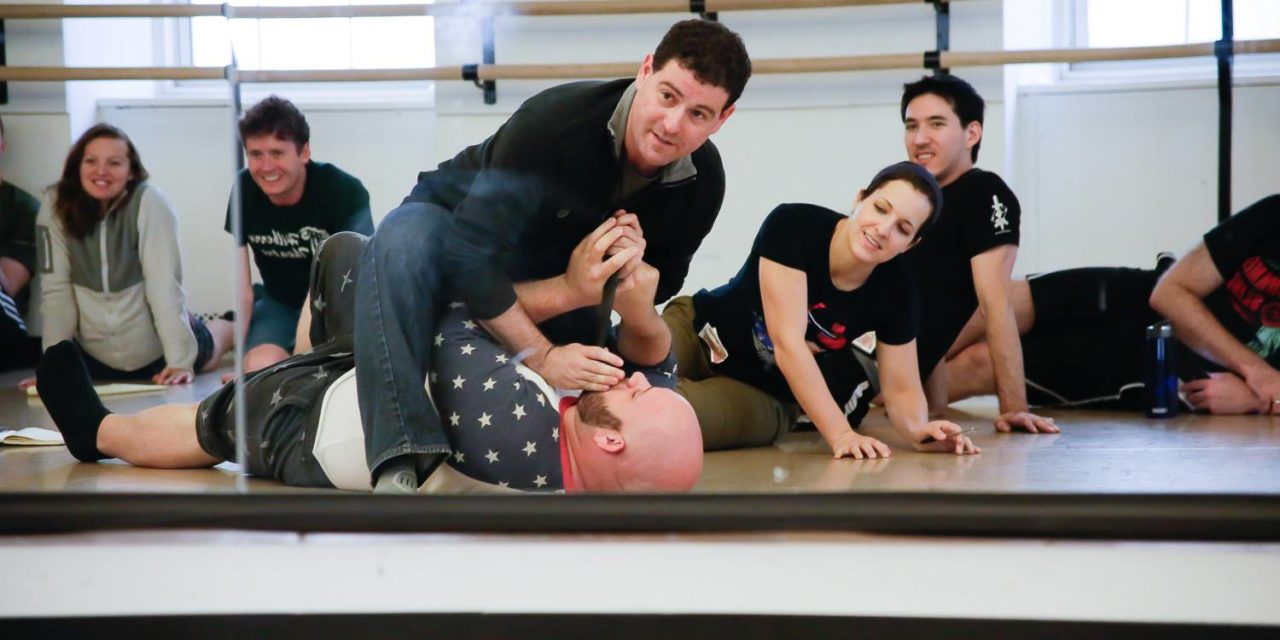Attention Young Actors: You don’t always know what you think you know.
This is especially true when it comes to stage combat. And you may want to think twice before you claim it on a resume. This is true even if you took a workshop or two and/or performed fights onstage a handful of times.
I’m talking mostly about the “Special Skills” section of the resume. As many of you know, common wisdom dictates that you should not put anything down on there that you cannot do on short notice. I want to work on the assumption that people are making their claims in good faith (liars are a whole other issue). That one would not put down a language that they do not speak, an instrument they do not play, or claim a degree that they have not earned.
But unfortunately, sometimes stage combat ends up on an acting resume when it really shouldn’t be…
What I personally suspect happens in many of these cases is that an actor might have been choreographed by a competent fight director in a production or two, become really proficient and comfortable with the stage combat that their role required, and walked away with some well-deserved confidence in themselves as a physical performer. This is a sign that the fight director did their job well. But, performing one or two set fights with the same scene partners over the course of a show, no matter how good it felt, is not reason enough to list stage combat as a special skill.
I tend to see a whole lot of actor resumes. Sometimes because I am involved in casting something, sometimes because I get a sneak peak at who I’ll be working with on a project. It’s also an experience I seek out because the entrepreneurial imperative of the American artist is a major scholarly interest of mine. For those of you who are not ShowFolk, acting resumes have a very different format than their conventional counterparts. One of the most noticeable differences is the “Special Skills” section. This is where an actor lists skills, abilities, and additional training that might help them in a role that requires that that specific action or set of actions be performed. This would include things like being proficient in various sports, martial arts, playing an instrument, speaking a foreign language, and perhaps, stage combat.
This applies to anything that ends up on the Special Skills section, but I’m focusing on stage combat because from my own perspective it appears to be misrepresented rather a lot (I admit that there is probably some sampling error involved here, but my point stands).
And my point is this: if your stage combat training and experience begins and ends with a ninety-minute workshop and/or consists of being in a couple shows where you were choreographed to do a handful of moves, it is misleading (and therefore a bad idea) to claim stage combat as a skill. If you are an actor who moves well, a competent fight director can build an effective fight with you. If you are not an actor who moves well, a competent fight director should still be able to build an effective fight with you based on the movements you are capable of and comfortable with. Should you claim skills and training that you do not have, you will seem at best amateur, and at worst dishonest (at the very worst, you or someone else in the cast may in fact be in physical danger). Neither will get you more work. A fight director (or any production staff member for that matter) would much rather be surprised and delighted by how well you pick up technique and how useful the bits and pieces you retained from previous shows are, than disappointed with a misrepresentation of training.
There is a logic I have heard thrown around that an actor should have anything and everything in their Special Skills section because you just don’t know what will get you the audition/role. There is a fallacy there. If a person could manage a cartwheel back in high school, and they put “Gymnastics” on their resume eight years later, they would in fact be wasting the time of anyone who called them in to an audition for anything that required actual gymnastics skills. The general rule is that one should not put anything down on a resume that they could not effective demonstrate on short notice.
Stage combat can be tempting to exaggerate (often with the best intentions) as there are plenty of legitimate brief introductory workshops happening all the time (I happen to teach lots of them in and around Boston these days). But a one-hour workshop does not an actor-combatant make.
If a person is auditioning for say, the role of Hamlet, their ability with classical text might make a director or casting agent pick them over another actor who is a fine swordsman but has middling diction, while the pair going up for Tybalt might have a different casting outcome. But if that first actor represented themselves as being highly proficient in theatrical swordplay and then when the time for fight choreography came they did not understand basic terms and this exchange happens:
Fight Director: “Didn’t you say that you trained with [Famous Stage Combat Teacher]?”/”I thought I was told that you had stage combat on your resume?”
Actor: “Yeah, (s)he was great! It was only a one-hour workshop though. Wow, that was seven years ago! Which end of this thing do I hold again?”
The actor makes a significantly worse impression than if it occurred this way:
Fight Director: “Have you done this before?”
Actor: “I took a workshop a couple years ago. We didn’t cover chainsaws though.”
Fight Director: “Not a problem, I’ll show you what you need to know.”
In the first exchange, the actor has made a misleading claim (perhaps innocently). The fight director, and probably the stage manager, will have doubts about the actor, and this can very well effect future relations. The mental energy expended in reassessing the actor’s fight capabilities would have been better used in teaching them what they need to know. In the second exchange, everyone is on the same page and the rehearsal should proceed smoothly. I have been the fight director in both situations. I much prefer the second.
Now, there are a couple ways that combat might end up listed on a resume. One is under Special Skills, the other is under Training. If it’s listed under training, like anything else the instructor is listed alongside the track. If an actor did a ninety-minute workshop in stage combat, they should perhaps list their training on their resume as a workshop so as not to be misleading. The reasons to take such a workshop include both learning the skill and being more employable. As far as the matter of being more employable goes, it’s important to represent one’s training accurately.
By way of example, in the United States The Society of American Fight Directors requires a minimum of 30 contact hours in any discipline before someone can take one of their Skills Proficiency Tests. Passing a test (or several) after 30 contact hours (per discipline) as compared to a one-day intro workshop is quite a significant difference. Even so, that organization is extremely careful about articulating what passing one of their tests does or does not mean. When I discussed this issue with colleagues in the stage combat community there was a fairly wide spectrum of opinion of when it would be fair to claim stage combat as a skill and what that would entail. What was consistent was that many actors make the claim with insufficient training and experience.
In short, if you make a claim on your resume, be able to back it up. If your claim is proficiency in stage combat, think about what led you to make that claim, and if you might be misleading yourself or potential employers.
And always, Fight Safe.
This post was written by the author in their personal capacity.The opinions expressed in this article are the author’s own and do not reflect the view of The Theatre Times, their staff or collaborators.
This post was written by Meron Langsner.
The views expressed here belong to the author and do not necessarily reflect our views and opinions.


















